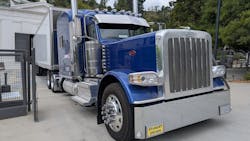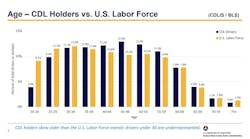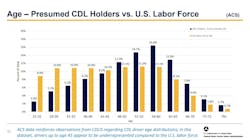Bridging the gap: How the trucking industry can attract Gen Z amidst labor challenges
Key takeaways:
- The trucking industry is facing significant labor shortages that need to be addressed for efficient operations.
- Recruiting Gen Z talent offers a promising opportunity to tackle labor challenges in the industry.
- Understanding the values and preferences of Gen Z, such as work-life balance and social responsibility, can improve recruitment strategies for trucking companies.
It’s no secret that the trucking industry faces labor challenges, though there’s debate over what exactly the problem is: high driver turnover or a true driver shortage. While the industry has sought multiple solutions, one option is to look at the upcoming generation.
“We're trying to put a Band-Aid on the problem,” Lindsey Trent, president and co-founder of the Next Generation in Trucking Association, said. “For years, it's just been about stealing drivers from one another … instead of really trying to create more opportunities for younger people to get into the industry.”
Gen Z roughly includes those born between 1997 and 2012. The exact number of Gen Z already in trucking is unknown, but the U.S. Department of Transportation’s recent data on trucking demographics is from 2023.
The above graphs specifically cover the age demographics of truck drivers. Now, let’s look at the age demographics for other transportation jobs.
Compared to millennials, Gen X, and baby boomers, Gen Z is less prominent in trucking and transportation (of course, some Gen Zers still aren’t 18 years old yet). For fleets and other trucking-related businesses, there’s an opportunity to recruit from this generation, especially at a time when many Gen Zers are rethinking college in the face of student loans. But why is Gen Z less prominent in trucking so far?
See also: Fleets Explained: Trucking industry careers
Obstacles keeping Gen Z from the trucking industry
Next Generation in Trucking Association is a nonprofit organization focused on promoting trucking as a positive career field, encouraging the training and employment of young people in the trucking industry, and promoting their education. According to its president and co-founder, a major obstacle Gen Z faces from entry into the industry is simply lack of awareness.
“People just don't know about opportunities, and in order to understand the opportunities out there, there has to be industry engagement,” Trent said. “And when there is industry engagement, the number of people going into that industry increases by a lot. So the number one biggest issue is just the fact that young people don't know about the opportunities.”
Trent stated that another major issue keeping Gen Z from joining the industry as drivers is a perceived industry issue. Some fleets may hesitate to hire drivers under 21 years old since said drivers cannot drive a truck across state lines. But Trent told FleetOwner that there are plenty of entry-level driver jobs that wouldn’t require younger drivers to cross state lines.
“There are plenty of CDL jobs that will hire an 18-year-old without crossing state lines, whether that's a farmer- or a yard spotter-type job,” Trent said. “It’s a matter of getting them connected to those jobs in their area, until they’re 21, where they would be able to expand their horizons and cross state lines.”
How to attract Gen Z to the trucking industry
For fleets wanting to recruit Gen Z into driver and other trucking roles, it’s important to understand Gen Z and what they want out of a career. According to Forbes, there are currently five generations active in the workforce, and each has different worldviews, priorities, and needs. Having worked with Gen Z professionally for years, Trent highlights the following qualities Gen Z wants from potential employers in the trucking industry:
- Work-life balance: More than possibly anything else, Gen Z cares about work-life balance. This could mean remote work, flexible schedules, etc.
- Defined career paths: Gen Z values clarity in their potential career paths and wants to know how they could advance in a company.
- Voices heard: Despite being young, Gen Z wants to know their voices will be heard in a company. Gen Z wants their opinions to matter to coworkers and supervisors, and they do not want to be ignored or discounted because they are newer to the workforce.
- Companies that care: According to Trent, Gen Z doesn’t want to work for companies that only care about the bottom line. They want to know that their employers care about community, the environment, and other causes.
- Mental health: In recent years, mental health awareness has grown significantly in the U.S. When looking for potential employers, Gen Z typically prioritizes companies that acknowledge mental health in their employees. According to Trent, having mental health benefits is appealing to Gen Z.
- Technology: Gen Z is often called digital natives, having grown up with computers, cell phones, and the internet. This means they expect their employers also to be technology-focused. Trent said employers wanting to attract Gen Z should invest in and focus on new technology.
“They [trucking companies] may think that Gen Z is lazy, but that really isn’t the case at all,” Trent said. “I think that they are excited about their future, and they want to have a long career.”
About the Author

Jenna Hume
Digital Editor
Digital Content Specialist Jenna Hume joined FleetOwner in November 2023 and previously worked as a writer in the gaming industry. She has a Bachelor of Fine Arts degree in creative writing from Truman State University and a master of Fine Arts degree in writing from Lindenwood University. She is currently based in Missouri.



